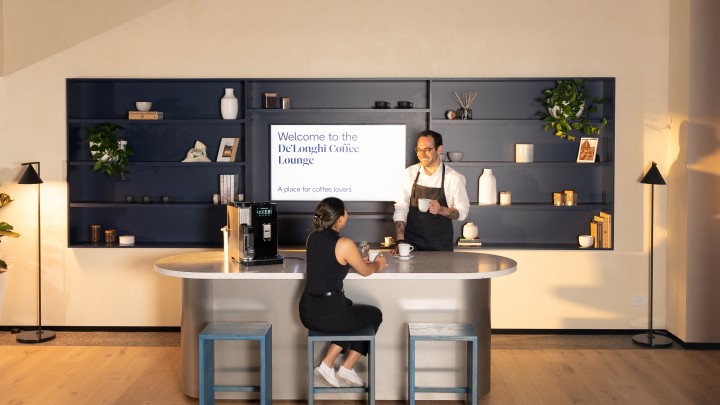During the height of the pandemic, coffee consumption changed radically. Customers stopped buying from baristas and started brewing their own. Nielsen Consumer Insights reported a 37 per cent increase in supermarket coffee sales – with more premium options seeing sales growth of over 40 per cent. And even though lockdowns have long since lifted, coffee giant De’Longhi says the brew-from-home trend could be here to stay. Toward the tail end of the pandemic lockdowns, De’Longhi launched its
d its first Coffee Lounge in Australia: A space for customers to come and explore the brand’s products, as well as attend in-person or virtual masterclasses to learn more about making coffee at home.
Launched in Sydney, in November 2021, the physical space enables customers to have a hands-on experience with De’Longhi’s coffee machines, and learn about everything that goes into achieving the perfect cup.
“There are weekly masterclasses that consumers can attend to expand their skills and knowledge about all things coffee and De’Longhi, and, in addition, customers can schedule a 1:1 session with our knowledgeable coffee experts,” De’Longhi Group’s marketing manager Sarah Knox told Inside Retail.
The store acts as a showroom, allowing customers to trial and learn about De’Longhi’s product lines and brand. The change, Knox explained, has worked well in concert with the way customers have been consuming their coffee.
“During the pandemic, we experienced an increase in coffee machine sales and accessories as customers sought to replicate the café experience at home,” Knox said.
“And purchasing behaviour has also changed, with increased online activity and options such as contact-free delivery and click-and-collect. Since then, we’ve continued to see growth and premiumisation in the category, as existing customers look to evolve their coffee experience and upgrade their machines to the latest innovations and technologies.”
At-home coffee brewing options have improved over the years, and are becoming a staple in the modern household as customers have learned how to get the most out of them. And, this shift could have an impact on the way coffee is consumed moving forward.
“Cafes have their place in providing social moments and convenience, but similarly, the ongoing popularity and demand for our coffee machines and accessories demonstrate that many consumers still opt to create their coffee at home,” Knox explained.
“Consumers have experienced how easy it is to create quality coffee at home, [and have seen] the financial benefits.”
Moving forward, the business’ products will reflect the greater customer knowledge and desire to make more styles of coffee at home.
This month, the business is launching its first manual coffee machine, which has the ability to make cold-brew coffee in under five minutes, and is pairing it with a new style of coffee grounds, Espresso Cool, to capitalise on a growing market of coffee drinkers.
Grounds for expansion
De’Longhi isn’t the only coffee company looking to deliver new experiences to more engaged customers, and putting a bigger focus on direct-to-consumer (DTC) operations as dining out once again becomes a nice-to-have.
Vittoria largely shifted to DTC during the pandemic due to the drop in its wholesale business, and has since developed a more robust e-commerce offer to capitalise on customers wanting café-quality coffee at home.
“A very big part of our business wasn’t operating at its full capacity, and it essentially gave us the time to focus on new revenue streams or things that we had in the plans but hadn’t had the time to focus on,” Vittoria’s managing director of food and beverage Rolando Schirato told Inside Retail earlier this year.
“We had an online presence, but it wasn’t a huge priority for us because our products were already distributed pretty broadly already. It was just one of those things that we weren’t giving enough attention to [pre-Covid], so online [has become] a big focus for us.”
Beyond online, however, Vittoria’s DTC offering has become more important in other ways – with once trade-exclusive formulations now available to the wider market, and consumer consumption driving product innovations, such as with Vittoria’s launch into instant coffee.

